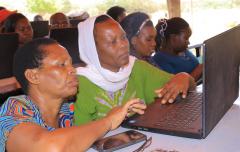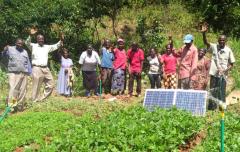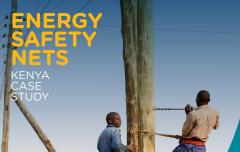Acacia Innovations provides clean cooking for schools in Kenya
In a series of stories, we are profiling the four winners of the 2020 Energy Access Booster Award, offered to entrepreneurs operating in Africa and Asia, with a focus on two sectors: clean cooking and waste-to-energy. The awards are sponsored by TOTAL, ENEA Consulting, Acumen and Sustainable Energy for All (SEforALL).
Highlights
When it’s lunchtime in Kenya’s schools, a heavy smoke fills the air. Mostly wood fuel and charcoal are used to prepare student meals. This practice comes with high costs for the environment, the health of cooks and students, and it is a financial burden for parents and schools. Using charcoal as a primary local source of fuel has largely contributed to Kenya’s massive deforestation. Once rich forests are now areas of dry land.
A large portion of fuel demand comes from Kenya’s schools. About 90 percent of public schools use firewood for cooking and pay up to USD 20,000 per year for the wood, which makes cooking fuel one of the biggest expenses in schools’ meal budgets.
Launched in October 2016, Acacia Innovations manufactures and distributes non-carbonized briquettes made of sugarcane waste, called Kuni Safi (which means “clean firewood” in Swahili). It distributes these eco-friendly briquettes mainly to schools and small businesses such as bakeries, a market that is often overlooked by other clean fuel providers targeting either large-scale industry or households.
The founder and CEO of Acacia Innovations, Elana Laichena, is an entrepreneur with experience in the renewable energy and clean cooking sector in Kenya and the US. "So far, we are the largest supplier of clean cooking fuels to schools in Kenya, with over 350 school customers in 20 counties," Laichena said. "We have sold over 4,000 tons of Kuni Safi briquettes to date, saving 100,000 trees and impacting over 175,000 school children by providing a smoke-free learning environment and contributing to affordable school meals. We have also created jobs for over 100 Kenyans, and over 50 percent are women."
Laichena noticed that no one was effectively serving schools and small businesses, which are major consumers of firewood in Kenya. "We estimate these institutions consume over 685,000 tons of firewood and charcoal per year. I decided to start a company focused on providing a cost-saving and eco-friendly cooking solution for schools since there is also a big social benefit of contributing to affordable meals for school children. We started as a distributor in October 2016, and when our demand exceeded supply, we set up our own factory in May 2018."
Kuni Safi briquettes are made of sugarcane fiber, which is abundant in Kenya. For every ton of briquettes, about four cubic meters of agricultural waste is recycled and 25 trees are conserved. These trees left standing will save five tons of CO2 over their lifetime. The briquettes burn nearly smoke-free and almost eliminate the smoke in school kitchens. Cooks no longer suffer from coughs and watery eyes and have a lower risk of pneumonia, lung cancer, heart disease and chronic obstructive pulmonary disease.
Although the briquettes can be used with any stove or hot water heater, Acacia Innovations also developed an energy-saving cookstove, especially for schools. The stoves that are manufactured locally are the first portable, institutional cookstoves in Kenya that can be used with non-carbonized briquettes, but also with firewood or charcoal
The company has already won several prizes for its innovative technology, such as the 2018 Start-Up Energy Transition Award and the Women in Energy Kenya Award. With the Energy Access Booster Award, Acacia Innovations will be able to reach even more schools and small businesses. "We are excited to work with the consultants in the Energy Access Booster team to be able to assess our pricing and see if we can better optimize our revenues while still delivering cost savings to our customers", Laichena said. "The money will be important for our company to expand our factory infrastructure and mitigate the economic downturn due to coronavirus."
Related content

SDG7 News
06 Dec 2019

SDG7 News
18 Jul 2019

SDG7 News
28 Jan 2019

Case study
19 Feb 2020
